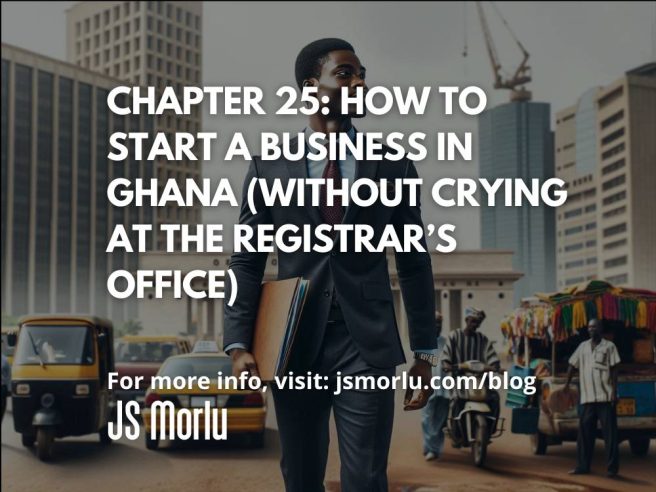By: John S. Morlu II, CPA
Welcome to Ghana, where opportunity is big, paperwork is bigger, and your patience will do push-ups. This guide keeps the jokes—and the steps—simple, so you can register once, smile twice, and only cry from joy.
1. Pick Your Business Structure (choose wisely)
Sole Proprietorship (aka “Business Name”):
Fast, cheap, you = the business. Easy to start, hard to sell.
Partnership:
Two+ people. Write your partnership agreement before the jollof.
Company Limited by Shares (most common):
Separate legal entity. Easier to raise money. Under Ghana’s Companies Act, you’ll need at least two directors, with one ordinarily resident in Ghana, plus a qualified company secretary.
Company Limited by Guarantee (nonprofit/associations):
No shares, but real governance.
External Company (branch of a foreign company):
If HQ stays abroad.
2. Reserve Your Name (don’t print business cards yet)
Create an account with the Office of the Registrar of Companies (ORC) and run a name search. If available, reserve it online. Name reservations typically hold for up to 60 days—renew if needed.
3. Get Your IDs Right (Ghana Card = your new TIN)
Since 1 April 2021, your Ghana Card PIN doubles as your Taxpayer Identification Number (TIN). Every director, shareholder and the company secretary needs one. Foreigners should have their valid passports and applicable permits; locals should have Ghana Cards.
4. Incorporate Online (ORC portal)
Fill in the ORC forms, upload IDs, and list:
- Registered office address (with digital address/GPS)
- Directors (min 2; one resident), company secretary & shareholders
- Stated capital (and share allocation)
- Business objects (what you’ll do)
You can adopt the model constitution (templates in the law) or upload your own. Pay fees; download your certificates when approved.
5. If There’s Foreign Ownership, Check GIPC Rules
Ghana Investment Promotion Centre (GIPC) registration may be required for foreign-owned firms. Typical minimum capital rules:
- Joint venture (foreign + Ghanaian): USD 200,000 (Ghanaian partner must hold ≥10%).
- Wholly foreign-owned (non-trading services/manufacturing): USD 500,000.
- Trading companies: USD 1,000,000 + employ at least 20 skilled Ghanaians.
Some sectors are reserved for Ghanaians only (e.g., petty retail, small taxi fleets under 25 vehicles, barber/beauty salons, sachet water retail, etc.).
6. Register for Taxes (and only charge VAT if you should)
Visit the Ghana Revenue Authority (GRA) to activate your tax accounts. If your taxable turnover will exceed the VAT threshold, register for VAT. Ghana’s standard VAT sits alongside levies (NHIL, GETFund, and the COVID‑19 Health Recovery Levy). Retailers with annual turnover between GHS 200,000 and GHS 500,000 may qualify for the VAT Flat Rate Scheme (VFRS). Ask GRA which scheme fits your business before you print receipts.
7. Hire? Then Register with SSNIT
If you’ll have employees, register as an employer with SSNIT and enroll staff so pension contributions are properly recorded. If you’re solo, consider the voluntary/self‑employed options too.
8. Get Your Local Business Operating Permit (BOP)
Your city/municipal assembly (MMDA) issues BOPs. In Accra (AMA), you’ll present your incorporation certificate, business details, address, and pay the fee. No BOP = the assembly may politely shut your doors. Different assemblies, same idea.
9. Sector Licenses (only if you need them)
- Food/cosmetics/household chemicals/medical devices: Register your products with the Food & Drugs Authority (FDA). Timelines and forms depend on risk category; check their site.
- Data Protection: If you handle personal data (customers, employees), register with the Data Protection Commission; renew every two years.
- Building/outdoor ads: Get the right permits from your Assembly if you’re building out or putting up signage.
10. Open a Business Bank Account (and maybe a MoMo Merchant)
Take your company documents, board resolution (if needed), and IDs to a bank. Consider a Mobile Money merchant account for everyday collections—clients will ask.
Pro-tip: Keep business and personal money separate. Future‑you (and your CPA) will sleep better.
How Long & How Much? (ballpark—your mileage may vary)
- Name search & reservation: 1–3 days
- Incorporation (clean documents): 3–10 business days
- GIPC registration (if applicable): 1–3 weeks after docs are complete
- BOP (assembly): depends on inspection schedules—budget 1–3 weeks
- Sector licenses (FDA, etc.): varies by product risk (plan ahead)
Avoiding Tears: Five Pro Moves
- IDs first. Make sure every director/shareholder has a Ghana Card/TIN.
- Pick the right entity early (foreign owners: read GIPC rules twice).
- Upload clean scans. Names and spellings must match across all documents.
- Don’t charge VAT until GRA says you can. Customers remember.
- Track renewals: BOP (yearly), DPC (every two years), GIPC (every two years), taxes (always).
Final Word (and a Little Laugh)
Registering a business in Ghana is like kenkey: a bit of wrapping, some steaming, then enjoyment.
Follow the steps, keep copies of everything, and smile at the counter. You’ll be operational before your second plate of waakye.
Quick References
- Companies Act, 2019 (Act 992) – Directors & constitutions (GIPC copy of Act 992).
- ORC (Registrar of Companies) – Name reservation & online portal.
- GRA – Ghana Card PIN used as TIN since April 1, 2021; VAT standard & VFRS pages.
- GIPC – Minimum capital: USD 200k JV, USD 500k wholly foreign-owned, USD 1m trading + 20 skilled Ghanaians.
- AMA/Assemblies – Business Operating Permit requirements.
- Data Protection Commission – Mandatory registration of data controllers/processors; 2‑year renewals.
- SSNIT – Employer registration and contributions.
📖 Coming Up Next: Chapter 26: The Road to Oil City — Potholes, Patience, and Premium Shocks
Author: John S. Morlu II, CPA is the CEO and Chief Strategist of JS Morlu, leads a globally recognized public accounting and management consultancy firm. Under his visionary leadership, JS Morlu has become a pioneer in developing cutting-edge technologies across B2B, B2C, P2P, and B2G verticals. The firm’s groundbreaking innovations include AI-powered reconciliation software (ReckSoft.com) and advanced cloud accounting solutions (FinovatePro.com), setting new industry standards for efficiency, accuracy, and technological excellence.
JS Morlu LLC is a top-tier accounting firm based in Woodbridge, Virginia, with a team of highly experienced and qualified CPAs and business advisors. We are dedicated to providing comprehensive accounting, tax, and business advisory services to clients throughout the Washington, D.C. Metro Area and the surrounding regions. With over a decade of experience, we have cultivated a deep understanding of our clients’ needs and aspirations. We recognize that our clients seek more than just value-added accounting services; they seek a trusted partner who can guide them towards achieving their business goals and personal financial well-being.
Talk to us || What our clients says about us





